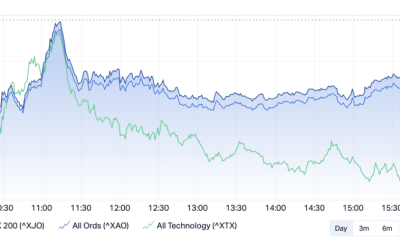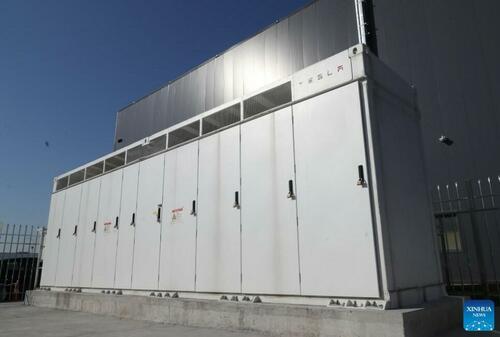Energy & Critical Metals
Rare Earth Elements And National Security: Reclaiming US Control Amid China’s Monopoly
Rare Earth Elements And National Security: Reclaiming US Control Amid China’s Monopoly
Authored by Antonio Graceffo via The Epoch Times,
The…

Rare Earth Elements And National Security: Reclaiming US Control Amid China’s Monopoly
Authored by Antonio Graceffo via The Epoch Times,
The Center for Strategic and International Studies on July 18 identified China’s control over gallium (a rare earth element) as a national security threat.
Rare earth elements (REEs) are crucial to the U.S. military, but China holds the key. China possesses 36 percent of the world’s known rare earth reserves and controls 70 percent of the world’s extractive capacity and an astonishing 90 percent of the processing capacity. This dominance in extraction and processing gives China a commanding position in the global REE market, raising concerns about resource security and international dependency.
REEs are critical to defense technology as modern weapons can’t be built, repaired, or maintained without them. Everything from F-35 fighter aircraft to cellphones depends on rare earths, as do critical space technologies, electronics, and semiconductors. Of the 50 minerals designated as critical by the U.S. Geological Survey, 17 are considered rare earths. Although the supply of REEs is sufficient to meet defense needs, extracting a small amount of rare earths requires mining a large quantity of waste materials.
In February 2022, the Biden White House issued a statement acknowledging how critical minerals provide the building blocks for many modern technologies and are essential to U.S. national security and economic prosperity. The statement went on to outline steps that the administration was taking to secure the U.S. supply chain. However, the problem remains unresolved.
One of the reasons why the United States and Western nations can’t compete with China in rare earth mining is environmental regulations. The necessity for permits and achieving environmental standards make mining REEs extremely difficult and expensive. The United States only has one REE mine, which is located in Mountain Pass, California.
In 2022, the White House granted $35 million to MP Materials to process REEs from Mountain Pass, but the company still sends its REE feedstock to China for advanced processing. Similarly, the United States provided funding to Australia’s Lynas Corporation for REE mining, but Lynas continues to outsource processing to China.
An apparent contradiction in the environmental regulations on mining REEs is that the same amount of pollution is being added to the Earth’s atmosphere, whether the REEs are mined and processed in the United States or China. Furthermore, green technologies are heavily dependent on REEs. Wind turbines, solar panels, and electric vehicle motors require REEs. Unless the United States and other nations dramatically increase their REE mining and processing, the world can never achieve the Paris Agreement’s climate change goals.
To meet emission reduction targets set by President Joe Biden, the United States will have to increase its electricity generation by 60 percent by 2030.
With the growing sales of electric cars and wind turbines, Boston Consulting Group estimates that demand for REE will increase to 466 kilotons by 2035 from 170 kilotons in 2022.
Given the size of the average REE project, 30 new projects would have to be put into operation by 2035. A shortfall will result in electricity outages and a reduction in the standard of living for most Americans.
It could take years for the United States to build sufficient REE mining and refining operations.
Under current regulations, it takes an average of 16 years for a permit to be awarded. Once greenlighted, REE projects are capital-intensive and take a great deal of time to turn a profit. Due to these difficulties and the uncertainty of earning a positive return, most established mining companies have steered away from the REE business. Boston Consulting Group estimates that keeping up with increasing demand would require an investment of $100 billion per year for the next 12 years.
Environmentalists suggest recycling REEs already above ground as a partial solution. The Heritage Foundation recommends that private industry and the U.S. Department of Defense should stockpile processed and semi-processed REEs. To rebuild the U.S. capacity to mine and process REEs, Congress must reduce the environmental restrictions. Federal and state agencies must also follow suit. Federal land where mining is prohibited should be reviewed and potentially reopened.
Furthermore, the United States should collaborate with its defense partners in Europe, Australia, North America, and Asia to establish mining and processing operations so allies could mitigate dependence on China. Finally, the Development Finance Corporation should be empowered to provide financing to U.S. corporations and those of friendly nations to establish mining and processing operations.
Tyler Durden
Sat, 08/19/2023 – 23:30
electric vehicle
rare earths
ree
gallium

Uranium Exploration Company Announces Additional Staking in the Athabasca Basin
Source: Streetwise Reports 12/22/2023
Skyharbour Resources Ltd. announced an update from its Canada-based Falcon Project along with additional…
Tesla Launches New Mega Factory Project In Shanghai, Designed To Manufacture 10,000 Megapacks Per Year
Tesla Launches New Mega Factory Project In Shanghai, Designed To Manufacture 10,000 Megapacks Per Year
Tesla has launched a new mega factory…
Giving thanks and taking stock after “a remarkable year”
An end-of-year thank you to our readers, industry colleagues and advertisers before Electric Autonomy breaks from publishing until Jan. 2
The post Giving…

















